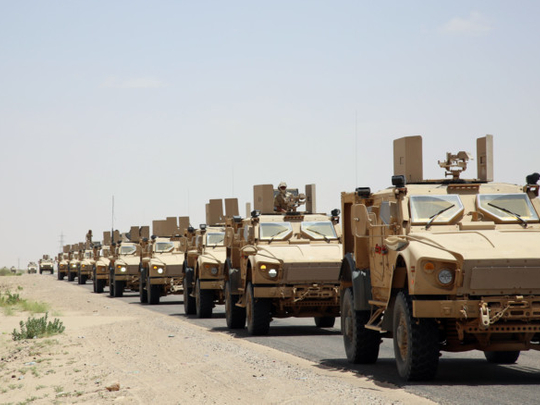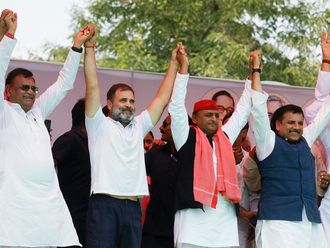
The Yemenis and all other honourable people know that the war in Yemen is a sacred duty, that it does not stem from a desire to be involved in military conflicts, but to save the lives of millions, said UAE’s Al Bayan newspaper. “The UAE is also exerting efforts in maintaining a balance in its war against terrorism by launching a humanitarian drive for the Yemeni people through the ‘Yemen, We Care’ campaign. Prior to the launch of the drive, humanitarian bridges were built and campaigns were launched, highlighting the fact that the UAE understands the need for relief work and economic development. The UAE Armed Forces will remain the arm that combats the unjust and the terrorists. The UAE is proud of its martyrs who sacrificed their lives in Yemen to defend the rights of the Yemeni people from the treachery and actions of terrorists,” the paper added.
The blood of the Arab coalition’s martyrs was spilled alongside those of their brothers in Yemen, wrote Qatar’s Al Sharq. “It is an obligation to recognise this Arab cohesion and solidarity, which is embodied in the blood of the martyrs; and that is exactly what the coalition is doing by liberating Yemen from the coup forces, and this is reflected in the impending liberation of Sana’a. Now that many months have passed since the launch of Operation Restoring Hope, conditions in Yemen seem to invoke optimism after the Arab coalition nations helped the popular resistance and national army in Yemen defeat the coup forces, resulting in the liberation of a number of governorates. This leaves Al Houthis, [former Yemeni president] Ali Abdullah Saleh and the regional power backing them with the sole option of submissively implementing the UN Security Council’s resolutions.”
The issue of migrants heading to Europe due to conflicts in the Middle East has been widely discussed in recent years, particularly following the Arab Spring, the pan-Arab newspaper Asharq Al Awsat said. “However, European Union governments have been caught off guard by the phenomenon as its effects have only just begun to hit them. If Europe is this worried about the entry of 200,000 people then we should now realise the difficult circumstances, which countries like Lebanon, Jordan and Turkey — which have limited economic abilities — have experienced as millions of refugees have fled to their cities and camps in recent years. Without the support of neighbouring countries who are hosting refugees and without military intervention, millions of people fleeing these conflicts will continue to attempt the journey into Europe — a stable continent with an economy capable of accommodating them — and the situation will worsen.”
There is no denying the reality that Europe, even when its politically divided, has attained a powerful ethical victory in the refugee crisis, said London-based Pan-Arab paper Al Quds Al Arabi. “In the midst of the worst refugee crisis in Europe since the Second World War, there are many questions and political, social, ethical and religious differences that stand out. In Europe, the Syrians witnessed different receptions. It sheds light on the massive divide in Europe.”





_resources1_16a31069e4e_small.jpg)




